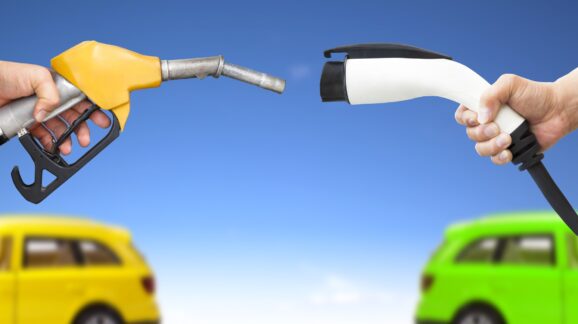Americans are rejecting EVs despite government meddling

Photo Credit: Getty
Some policymakers across the country continue to try and get American drivers out of gas-powered cars and into electric vehicles (EVs), using a mix of mandates and subsidies to force a transition. The need for these policies demonstrates that consumers are not voluntarily choosing to buy EVs at a level desired by these policymakers.
Former President Trump vowed to “end the electric vehicle mandate on day one,” if he were to retake the Oval Office. His opposition to the forced transition to EVs is in line with protecting consumer freedom and reflects consumer preference. Many legislators also recognize the problems of this forced transition.
Not surprisingly, there was an increase in new EV sales due to all the government meddling, including massive subsidies. But new EV sales are still a small percentage of all new vehicle sales, at just about 7 percent. And the bump that the meddling provided is faltering, with sales slowing and even declining in the first quarter of 2024. Recent data suggests that car buyers are growing less interested in electric cars. A new McKinsey & Co. survey reveals that nearly half of American EV owners are considering a return to traditional gasoline or diesel vehicles.
Many consumers are hesitant to adopt electric vehicles due to concerns about reliability, high prices, and limited charging options. The rising cost of electricity and the poor performance of EV batteries in colder climates make traditional fossil-fueled vehicles more appealing, especially as the risk of blackouts in some regions grows.
A 2024 Gallup Poll reported a similar change in consumer tastes between 2023 and 2024. People are becoming more wary of buying an EV, even though there has been an increase in EV ownership. The poll found:
[F]ewer Americans — 35%, down from 43% in 2023 — say they might consider buying an EV in the future…Overall, less than half of adults, 44%, now say they are either seriously considering or might consider buying an EV in the future, down from 55% in 2023, while the proportion not intending to buy one has increased from 41% to 48%.

Choosing between a gas and electric car involves significant tradeoffs. Lack of charging infrastructure, high ownership costs, and the complexity of long-distance trips and are practical concerns for EV drivers. These considerations may explain why an EV may make sense as a second or third vehicle in a household, but not as the primary or only vehicle. After several years of EVs being on the market, we’re now observing EV owners adapting to the hidden costs and inconveniences associated with electric vehicles.
This consumer dissatisfaction is evident in the market. Major auto manufacturers like Ford, GM, and Mercedes-Benz have delayed or scaled back their EV plans. Hertz, a rental car company, made headlines last year by selling off their line of EV cars due to inefficacy.
Despite these clear market signals, some lawmakers seem determined to manipulate the market and force further electrification.
American taxpayers and car buyers deserve better than to be guinea pigs for impractical and costly EV experiments. Instead of mandates, we should let the market drive innovation in the transportation industry.
If EVs truly offer superior value, consumers will choose them without government intervention. The fact that so many current EV owners are looking to switch back to conventional vehicles speaks volumes.
Our lawmakers would do well to heed this wake-up call. Rather than push Americans into vehicles they don’t want and can’t afford, they should focus on policies that allow greater consumer freedom and foster true innovation. The road to a prosperous future isn’t paved with government mandates – it’s built on the bedrock of options and innovation.